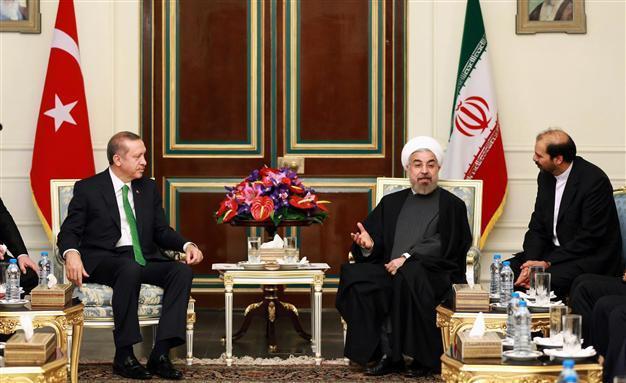Turkey voices will to expand energy deals with Iran during PM Erdoğan’s visit
TEHRAN

Iranian President Hassan Rouhani, second right, talks with Turkish Prime Minister Recep Tayyip Erdogan, left, in their meeting in Tehran, Iran, Wednesday, Jan. 29, 2014. AP Photo
Turkish Prime Minister Recep Tayyip Erdoğan has arrived in Iran with the expectation of expanding economic cooperation between the parties, particularly with new energy deals that would feed the energy-thirsty country.
“It is obvious that we import crude oil and gas from Iran, which are strategic energy sources, and we [will be] able to increase the volume of these imports,” Erdoğan said in Tehran after inking several documents on cooperation with Iran on Jan. 29, Fars News Agency reported.
“Today we had a good chance to review bilateral ties,” Erdoğan said in remarks translated into Farsi and made during a meeting with Iranian Vice President Eshaq shown by Iranian television.
Turkey is keen to increase oil and gas imports from Tehran in anticipation of sanctions against Iran’s huge energy sector being dismantled in the wake of the Nov. 24 deal between Tehran and six big powers under which the Islamic Republic committed to scaling back some of its controversial nuclear activities.
Despite claiming Turkey is not seeking any new deal with Iran ahead of his departure to Iran, Turkish Energy Minister Taner Yıldız, who accompanies the prime minister during his visit, admitted the intention for such a new agreement on Jan. 29.
Speaking to reporters after yesterday’s press meeting, Yıldız said no agreement had been reached but there was the will, while clarifying a translation mistake made during the conveyance of Jahangiri’s speech.
Three trade deals were signed yesterday after Erdoğan’s arrival in Tehran, Iranian state television reported, but no details were disclosed regarding the scope of the deals.
“I would like to mention specifically, and to express my satisfaction with, the agreement we signed in the preferential trade field,” Erdoğan said.
Some sanctions that were imposed over suspicions that Iran was covertly trying to develop a nuclear weapons capability, something it denies, were relaxed starting on Jan. 20.
But most sanctions, including a severe squeeze on Iran’s access to the international financial system, remain in force pending a long-term agreement on the scope of Iran’s nuclear program, which is to be negotiated over the next six months.
Still, the post-sanctions potential of a market of 76 million people in Iran with some of the world’s biggest oil and gas reserves is a magnet for foreign investors, including Turkish companies.
“We hope the process will be finalized with an agreement that will ensure the removal of all sanctions on Iran. Turkey has so far done its best in that regard and will continue to do so,” Erdoğan told reporters in Ankara ahead of his departure.
Iranian officials say trade between the countries stood at $22 billion (16.2 billion euros) in 2012, before dipping to $20 billion in 2013. It is expected to reach $30 billion in 2015.
Iran was Turkey’s third largest export market in 2012. In fact, Iranian media reported, Turkey exported more than 20,000 products to Iran, among them gold and silver.
The gold trade boomed in 2012 when Ankara was paying for Iranian natural gas and oil imports with the Turkish Lira and Tehran was using those deposits held in Turkey’s state-run Halkbank to buy gold.
Some of the gold was held inside Turkey at the peak of the trade while some was taken to Dubai by couriers to be sold for foreign currency that was urgently needed by Iran as sanctions increasingly cut off access.
